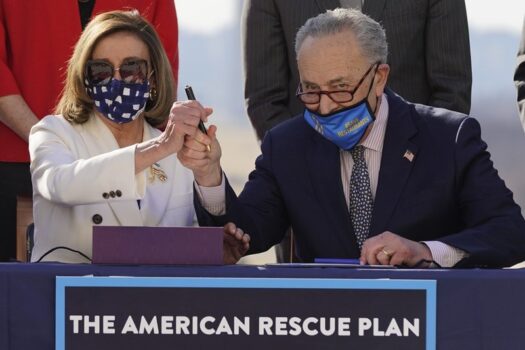 The US Congress approved a sweeping $1.9 trillion coronavirus relief package on Wednesday, authorizing a flurry of new federal spending and a temporary yet dramatic increase in anti-poverty programs to help millions of families still struggling amid the pandemic.
The US Congress approved a sweeping $1.9 trillion coronavirus relief package on Wednesday, authorizing a flurry of new federal spending and a temporary yet dramatic increase in anti-poverty programs to help millions of families still struggling amid the pandemic.
President Joe Biden hopes to sign the bill Friday after Congress formally sends it to the White House, which can take days for large bills. Biden will check off his first major legislative item as the U.S. tries to ramp up Covid-19 vaccinations and jolt the economy.
Here are the proposal’s major pieces:
- It extends a $300 per week jobless aid supplement and programs making millions more people eligible for unemployment insurance until Sept. 6. The plan also makes an individual’s first $10,200 in jobless benefits tax-free.
- The bill sends $1,400 direct payments to most Americans and their dependents. The checks start to phase out at $75,000 in income for individuals and are capped at people who make $80,000. The thresholds for joint filers are double those limits. The government will base eligibility on Americans’ most recent filed tax return.
- It expands the child tax credit for one year. It will increase to $3,600 for children under 6 and to $3,000 for kids between 6 and 17.
- The plan puts about $20 billion into Covid-19 vaccine manufacturing and distribution, along with roughly $50 billion into testing and contact tracing.
- It adds $25 billion in rental and utility assistance and about $10 billion for mortgage aid.
- The plan offers $350 billion in relief to state, local and tribal governments.
- The proposal directs more than $120 billion to K-12 schools.
- It increases the Supplemental Nutrition Assistance Program benefit by 15% through September.
- The bill includes an expansion of subsidies and other provisions to help Americans afford health insurance.
- It offers nearly $30 billion in aid to restaurants.
- The legislation expands an employee retention tax credit designed to allow companies to keep workers on payroll.
The bill passed the House by a 220-211 margin without a Republican vote, as the GOP argues the job market has recovered enough to warrant little or no new stimulus spending. One Democrat, Rep. Jared Golden of Maine, opposed it. Democrats also approved the plan on their own in the Senate through the special budget reconciliation process.
Biden in a statement Wednesday celebrated the bill’s passage and said he planned to sign it into law Friday.
“This legislation is about giving the backbone of this nation – the essential workers, the working people who built this country, the people who keep this country going – a fighting chance,” he said.

ICC Issues Arrest Warrants For Netanyahu, Gallant And Al-Masri
Russia Fires Intercontinental Missile In Ukraine Attack — Kyiv
South African Police Raid Warehouses Amid Food Poisoning Deaths
Russian Missile Strike Kills Eight, Wounds 39 In Ukraine’s Odesa Region